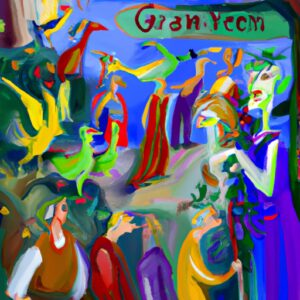Italian grammar lessons
- 03/27/2024
What does ora che mean in Italian? Before we start with today’s post, we recommend listening to this song to get in the mood: “Ora che ho te” by Claudio...
- 02/13/2024
Struggling with Italian grammar? Confused between congiuntivo presente and imperfetto? This blog post will help! Learn the subtle differences between these two tenses. You can say goodbye to Italian grammar...
- 11/02/2023
Struggling with questions in Italian? Uncover the rules for Chi, Cosa and more with our step-by-step guide. You’ll be able to form Italian questions with confidence. Italian Question Inversion Rules...
- 10/14/2023
Ever feel lost when speaking Italian? Not anymore! This article takes out the confusion about “qui”, “qua”, and “di qua”. You’ll learn how and where to use each word. Master...
- 10/13/2023
Confused about Italian conjunctions? Not sure what’s the difference between “però” and “ma”? Don’t worry! This blog is here to help. We’ll show you how to effectively use these two...
- 10/12/2023
Trouble Identifying the Gender of Italian Nouns Ending with ‘e’? Not to worry! This article is here to help. We’ll provide a simple guide to make sure you can easily...
- 08/28/2023
Italian tenses are an essential part of learning the Italian language. They are used to indicate the time and duration of an action or event. Mastering the Italian tenses is...
- 08/28/2023
An Italian grammar checker is a tool designed to assist individuals in improving their written Italian language skills. It helps identify and correct grammatical errors, spelling mistakes, punctuation errors, and...
- 08/28/2023
Italian grammar is a fundamental aspect of learning the Italian language. It encompasses various rules and structures that govern the formation and arrangement of words into meaningful sentences. Understanding Italian...
- 07/08/2023
Understanding and Using “Da Quando Saremo Arrivati” in Italian In the Italian language, various expressions add color and depth to conversations. One such expression is “da quando saremo arrivati,” which...
- 07/08/2023
Understanding the Verb “Fare” The Italian language is known for its rich and versatile verbs, and one such verb is “fare.” The verb “fare” encompasses various meanings such as “to...
- 06/24/2023
Unlock the secrets of advanced language learning in Italian. Expand vocabulary, refine grammar, and become a confident, fluent speaker. Start Learning Italian Now: Commit to Daily Practice Learning Italian can...
- 06/17/2023
Learn Italian with contrastive analysis, an accelerated language acquisition method. Enhance grammar, vocabulary, and fluency in our comprehensive guide. Join the linguistic adventure to unlock Italy’s beauty. Understanding the contrastive...
- 06/01/2023
Explore the advantages of learning Italian at a young age, from cognitive development to enhanced communication. This article highlights the remarkable benefits that await young learners of the Italian language....
- 05/25/2023
Unleash the power of Italian conjunctions with our comprehensive guide, from coordinating to subordinating conjunctions, and master fluent expression. Enhance your writing, elevate your speaking, and unlock Italian’s magic. Let’s...
- 05/25/2022
What are regular Italian verbs? There are many irregular verbs in the Italian language, including the auxiliary verbs essere and avere. They are called irregular because the endings in some...
- 03/01/2022
What is the progressive tense? In Italian, how can you say that something is happening at the time you’re speaking? This idea can be described in English using the present...
- 02/23/2022
What is the present progressive? If you need to say something that is happening right now, you’ll need to use the present progressive in Italian (presente progressivo). It is equivalent...
- 10/05/2021
What does da una parte… dall’altra means? If you’re here, it means your Italian is getting good, so well done! We can use Da una parte… dall’altra when we speak...
- 10/04/2021
What is quando in Italian? Quando is one of the Italian Five Ws (chi, cosa, dove, quando, perché) and is a must-know for Italian students. The meaning of quando can be both when and once,...
- 10/03/2021
What does almeno mean in Italian? In this lesson, we will look at how to say at least in Italian and how to use it correctly within a sentence. Let’s...
- 10/01/2021
To go vs. to go out In this post, we’re going to focus on the verbs uscire and andare conjugation in the present tense, and we’re going to see some...
- 09/30/2021
What is servire a in Italian? The expression servire a is used in Italian to describe the purpose something serves (yes, servire on its own can also mean to serve)....
- 09/29/2021
What’s the meaning of non solo…ma anche in Italian? This sentence is pretty easy to remember because, unlike many other cases, it’s a literal translation: in English we say not...
- 09/28/2021
What restare and rimanere mean in Italian? In this lesson, we will look at the Italian verbs restare and rimanere. They both mean to remain, to be left, to stay. Let’s have...
- 09/27/2021
What are phrasal verbs? Look at the following phrases and think about what they mean: Bump into Come up with Drop by Give out Run out of These are phrasal...
- 09/26/2021
I got hungry in Italian In Italian, there are two expressions for saying “I got hungry” and “I got thirsty”: mi è venuta fame and mi è venuta sete. Let’s see...
- 09/25/2021
What does magari mean? In this lesson, we will not only look at what magari means but also at how to use it correctly in different contexts. Here are some examples...
- 09/24/2021
What are opposite adjectives? Learning a foreign language is great! It can also be fun, rewarding, and exciting. Some other times you might think it’s exhausting, challenging, and overwhelming. The...
- 09/23/2021
What is finché in Italian? Finché can be translated into English as long as both in an abstract and time-related sense. Let’s get started! Finché va bene a lui, va bene...
- 09/22/2021
How to use sembra che + subjunctive in Italian? Learn the grammar with simple rules and examples and practice with audio lessons.
- 09/19/2021
What is the Italian compound gerund? The Italian present gerund is the equivalent of the English -ing, as in eating. You’ll spot it because it ends in -ando or in...
- 09/18/2021
What is the passive voice? Let’s look at an example of the Passive voice in Italian: A: Il cane ha mangiato la gallina. A: The dog eats the hen. And...
- 09/17/2021
What does in modo da means Italian? Before we start, read the following sentences: He sat at the front so as to be able to hear. She will go to...
- 09/16/2021
What does intanto mean in Italian? In this lesson, we’re going to learn about a very common time word: intanto, which means in the meantime. Interestingly, though, this time word...
- 09/15/2021
The Italian present gerund The gerund is a verbal mood. You’ll spot it very easily because it ends in -ando or in -endo. We use the gerund in two cases:...
- 09/14/2021
What does oltre a means in Italian? Today we’re going to learn how to say other than in Italian. Before we go into more detail, let’s understand when we use...
- 09/12/2021
How to use in the case that + subjunctive in Italian? Learn the grammar with simple rules and examples and practice with audio lessons.
- 09/11/2021
How to use how long/since when in Italian? Learn the grammar with simple rules and examples and practice with audio lessons.
- 09/10/2021
What is the Italian infinitive? To understand what an infinitive is, you need to know what a verb is. A verb is a word that refers to an action. Examples...
- 09/09/2021
How to say even though in Italian? We all know how useful the expression even though is. And this is exactly why today we will learn how to use it in...
- 09/08/2021
What is the passive voice? We use the passive voice when we want to emphasize the person or thing receiving the action or the action itself. For example, instead of...
- 09/07/2021
What is the passive voice? In this post, we’re going to focus on how to form the passive voice with the verb andare. Have a look at the two examples...
- 09/06/2021
When to use affinché, in modo che, or così che? Affinché, in modo che, and così che are not very common in oral Italian. However, they are in written language....
- 09/05/2021
What does dipende mean in Italian? “Dipende. Da che dipende? Da che punto guardi il mondo. Tutto dipende.” Have you ever heard that song by the Spanish group Jarabe de Palo? If not,...
- 09/04/2021
Italian adverbs of time We, humans, like to think of everything in terms of space and time. We like to place moments on a timeline to organize events. We think...
- 09/03/2021
How to use the more… the more… in Italian? This is certainly a good expression to add to your Italian repertoire if you want to sound like a native, and...
- 09/02/2021
What does “tra” mean in Italian? In today’s grammar note, we’re going to focus on how to use tra, which is a very small but common word. It is very...
- 09/01/2021
What does apposta mean in Italian? If you want to learn what the Italian word apposta means and how to use it correctly, keep on reading. Firstly, let’s see some...
- 08/31/2021
How to say each other in Italian? In a previous lesson, we’ve seen one way of saying each other: with reflexive verbs. L’uno and l’altro pronouns, on their own, are...
- 08/29/2021
How to say more and more in Italian? In English, these expressions are called double comparatives. To convey the meaning of “more and more” in Italian we use the following...
- 08/28/2021
What pure means in Italian? Pure is a very common word among Italian speakers. It’s also a very interesting one because, like many other Italian words, it has different meanings...
- 08/27/2021
What does tanto per mean in Italian? We have an interesting combination of words in Italian to say just to, in order to, or to. You wouldn’t guess, if we...
- 08/26/2021
How to say what in Italian? In all languages, there are certain words that can be translated in very different ways, especially when it comes to short words. Think of...
- 08/25/2021
What is the meaning of credere di in Italian? In today’s post, we’re going to focus on when we say credere di. And, just so you know, the same rules...
- 08/24/2021
What do secondo and in base a mean in Italian? In today’s post, you’re going to learn how to reference someone else’s words and how to use facts and ideas...
- 08/23/2021
What does così tanto che mean in Italian? If you’re wondering how to say so much that in Italian, you came to the right place. Keep on reading to figure...
- 08/22/2021
Non sapevo che + subjunctive Here we are again with the subjunctive. You can check the previous lessons if you need to review something about the congiuntivo presente and the...
- 08/21/2021
What’s the meaning of uguale in Italian? Uguale meansidentical, the same, and equal. We use it when we want to refer to something or someone having identical characteristics as something...
- 08/20/2021
What does mettersi mean in Italian? Mettersi is the reflexive form of mettere (to put), and it can be used combined with the Italian preposition a. First of all, let’s...
- 08/19/2021
What is venire bene and venire male in Italian? Venire bene and venire maleare Italian expressions you can find in everyday language. Let’s look at these examples in contexts of how...
- 08/18/2021
What is per in Italian? The Italian preposition per can be translated into English in many different ways and can be used in a variety of grammatical constructions. Let’s see some...
- 08/17/2021
What is si vede che in Italian? The Italian impersonal expression si vede che can be used with many different meanings. In this lesson, we will see what it means...
- 08/16/2021
What is senza in Italian? Senza comes from the Latin word absentia, which means absence. So, if you think about it, it makes sense since both senza and without mean...
- 08/15/2021
What is stesso in Italian? Stesso refers to something or someone that’s exactly like something or someone else. This means it involves two or more things or people. We can...
- 08/14/2021
How to use in effetti? We use it to emphasize a statement or confirm something that has just been suggested either by us or by someone else. In effetti is...
- 08/13/2021
What does invece mean? Invece is a very common word in Italian. You’ll hear it all the time if you go to Italy or if you hang out with Italians....
- 08/12/2021
E penso a te Before we start, try listening to the song below to get in the mood for today’s lesson. It’s called E penso a te and was composed by...
- 08/11/2021
What does tanto mean in Italian? If you’ve been learning Italian for a while, you are probably already familiar with the word tanto, which can be used as both an adjective...
- 08/10/2021
What does come mean in Italian? Come can be translated into English as how. You’ve probably heard this word many times because it is one of the ways to ask...
- 08/09/2021
What is infatti in Italian? Because of the way it sounds, you might think that the Italian wordinfatti will translate to the English “in fact”. However, even if it can sometimes...
- 08/08/2021
How to say straight away in Italian? In Italian, we have just one short but very useful word: subito. (Just so you know, the stress goes on the “u”). Interestingly,...
- 08/07/2021
What is ormai in Italian? Ormai is an adverb of time, and it can generally be translated into English by now. However, it can take on different shades of meaning...
- 08/06/2021
What is mi sa che in Italian? Like other informal expressions, mi sa che doesn’t have exact equivalents in other languages. In fact, there is no literal translation for this...
- 08/05/2021
What does ogni volta che mean in Italian? Ogni is a very common and versatile word in Italian. It might mean each, every, and all. In today’s lesson, we’re going...
- 08/04/2021
What does può darsi che mean in Italian? In this post, we’re going to focus on one of those expressions that are followed by the Italian subjunctive: the equivalent of...
- 08/03/2021
How to use "appena" in Italian? Learn the grammar with simple rules and examples and practice with audio lessons.
- 08/03/2021
What does mezzo and metà mean? In Italian, there are two ways of translating the English word half: mezzo and metà. L’ho diviso a metà. I split it in half....
- 08/02/2021
What does rendere mean? If you go through all the definitions of the word rendere and then check the meanings of the English word to render, you will notice many...
- 08/01/2021
What do iniziare and cominciare mean in Italian? To say to start or to begin in Italian, we can use two verbs: iniziare and cominciare. These two verbs are interchangeable...
- 07/31/2021
What is ma in Italian? We’re going to learn how to say but in Italian. It’s just a two-letter word: ma. Like in English, we use the equivalent of but...
- 07/31/2021
How to use non so se in Italian? If you’re wondering what non so se means in Italian and how to structure it, you’re in the right place. In English, non...
- 07/30/2021
What does hai voglia di mean in Italian? In Italian, there are different ways to ask someone if they feel like doing something. If you want to ask a friend...
- 07/29/2021
How to say then in Italian? Explaining what we did in a chronological way is always useful in any language. It helps us organize ideas and events and lets others...
- 07/28/2021
How to say this and that in Italian? In English, there is a difference between saying this book and that book. This book refers to an object closer to you...
- 07/27/2021
What is the conjugation of potere, volere, and dovere? As we saw in a previous lesson about the irregular future tense, we use the future tense to talk about something that will...
- 07/24/2021
What is the present participle? You might be familiar with this term or you might have never heard of it because you won’t usually find the Italian present participle in...
- 07/23/2021
What does pretendere mean in Italian? First of all, the Italian verb pretendere is a false friend, which means it looks and sounds like the verb pretend in English, but...
- 07/22/2021
What is non essere che in Italian? In today’s post, we’re going to focus on the expression: non essere che. Of course, the verb essere has to be conjugated depending...
- 07/21/2021
What does tranne mean in Italian? When we make exceptions, we are excluding something or someone. In Italian, there’s a similar word to the word exception with exactly the same...
- 07/20/2021
What do allora and quindi mean in Italian? If you’ve been around Italian people or have watched Italian movies, I am sure you heard the words quindi and allora over and...
- 07/20/2021
What is future tense + anche in Italian? Did you know in Italian we use the future tense even if we’re not talking about the future? More precisely, in some...
- 07/19/2021
What is the meaning of ci in Italian? In all languages, there are certain words that are tricky to fully understand. This is because they usually have many different meanings...
- 07/17/2021
The Italian subjunctive We use the Italian verb form congiuntivo, the subjunctive, to talk about hopes, hypotheses, desires, fears, possibilities, uncertain situations, and doubts. And you will find it a...
- 07/16/2021
The Italian subjunctive If you’re here, it means you probably already heard about congiuntivo (the subjunctive). If you haven’t, here’s a quick explanation of what it is: the subjunctive is...
- 07/15/2021
What are if clauses? If clauses are those sentences that mention a condition introduced by the word if. This clause is usually followed, or preceded, by a consequence. Let’s have...
- 07/14/2021
What are if clauses? If you don’t know what if clauses are, here are some examples in English for you to understand better: If you cry, you feel better afterward....
- 07/13/2021
What is a pronoun? To get started with today’s lesson, have a look at the following sentences: Ho perso la mia borsa. Fammi sapere se la trovi. I lost my...
- 07/12/2021
How to say “or” in Italian? Learn the grammar with simple rules and examples and practice with audio lessons.





























































































